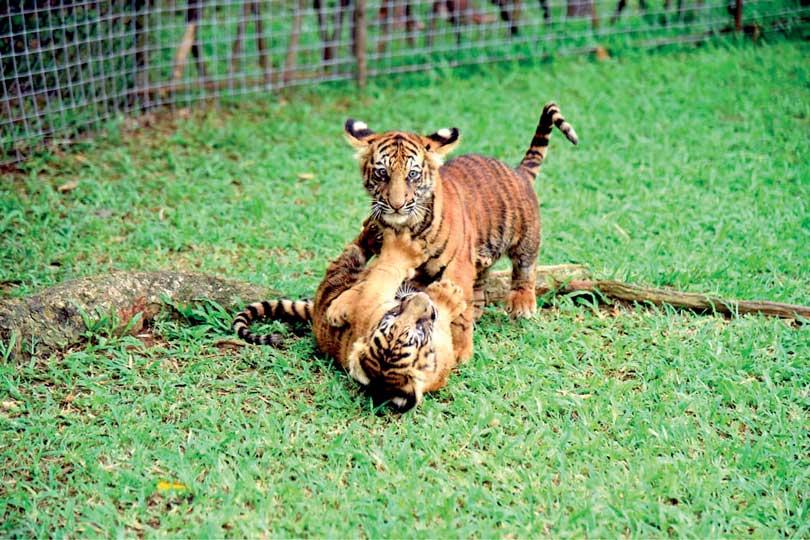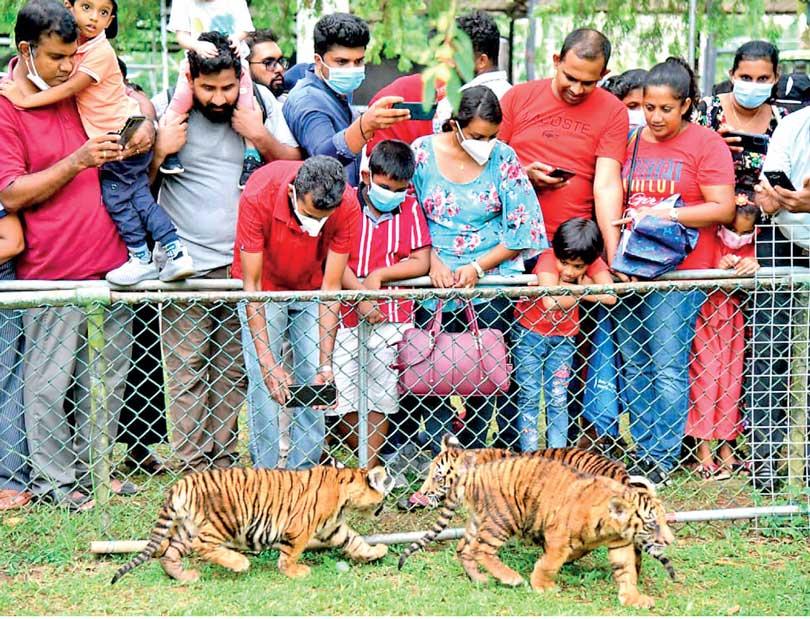13 Jun 2022 - {{hitsCtrl.values.hits}}

 Animal rights activists have continued to voice concerns on captive breeding programmes and wastage of supplies obtained to feed animals at the Dehiwela Zoo. Recently Zoological Gardens officials had reportedly complained to the Minister of Wildlife of a shortage of finances to feed animals in the coming months.
Animal rights activists have continued to voice concerns on captive breeding programmes and wastage of supplies obtained to feed animals at the Dehiwela Zoo. Recently Zoological Gardens officials had reportedly complained to the Minister of Wildlife of a shortage of finances to feed animals in the coming months.
Alternatives ignored for tenders?
The Daily Mirror Life reliably learned that the supplies (mainly imported fruits and vegetables) which are obtained through tender procedures could be substituted with locally grown produce. A source that spoke on conditions of anonymity said that instead of salad leaves, apples and other imported fruits, the animals could be given substitutes such as bananas, gotukola etc. “The animals are used to the natural way of life but zoo officials would peel the fruits and give the animals. In most instances, food trays return since they are unaware of the feeding capacity of animals. One could observe the wastage if they see the dustbins.”
It is in this backdrop that suggestions were made to grow local produce, for example at the 200 acres of unused land at Ridiyagama Safari Park. “But since they rely on tenders they continue to get cheaper food at exorbitant rates, for example, a King coconut priced at Rs. 100. Therefore the middlemen make their money. Certain food items could be substituted with punnakku (a type of animal feed) but they give bread instead. They also chop bananas etc., and therefore they have no count of how many bananas were given. Since they continue to rely on tenders if animals were given six fruits per day, it had to be reduced to four and so on. Pumpkin for instance is seldom in the diet since an easy buck cannot be made, the source alleged. Grass could be grown as well. On the other hand there’s no cold storage facility at Ridiyagama. Therefore produce has to be stored elsewhere and provided to animals.”
The source said that it is a challenge to continue on a rigid menu with the prevailing economic crisis. “There has to be a way to substitute food items with cheaper alternatives. There were suggestions to let the animals out but how will they survive? Another suggestion had been to get fruits and vegetables farmers from Nuwara Eliya to grow the produce required for the Zoo. While all these options are available, Zoo officials continue to rely on tenders.”
Certain food items could be substituted with punnakku (a type of animal feed) but they give bread instead. They also chop bananas etc., and therefore they have no count of how many bananas were given.
Time to close down zoos permanently : Animal Rights activist
“We anticipated this with the prevailing economic crisis in the country,” opined Panchali Panapitiya of Rally for Animal Rights and Environment. “As I hear the Zoo department has to pay debts amounting to Rs. 57 million to its suppliers and the Zoo Department requires another Rs. 12 million till December but the Government has allocated only Rs. 15 million.

“The issue is not just about food. Animals in captivity have to be given vitamins, supplements, vaccinations as they are not living in their own natural habitat.They are not on their natural diets. Captivity itself causes many physical and mental diseases to animals that require to be treated and most importantly there needs to be medicine to treat sick animals.Even chemicals are needed to clean enclosures, fish tanks, pools etc. If any of these are not given the animals would suffer and would cause fatalities. As it is the Sri Lankan zoo system does not have good animal welfare standards and the situation is going to get worse for animals,” she said further.
“We animal rights activists have always advocated against breeding animals in captivity. However the Zoological Gardens Department never took our advise and they never took efficient steps to use contraceptives for animals. There is an excess of lions , deer , donkeys and many other big and small animals. But they kept on breeding. This was a waste of money and cruelty towards animals.Even before the crisis this was a waste of money especially at the Pinnawala Orphanage where elephant calves were bred. Elephants are never bred and males and females are kept separate even
 in the best of elephant sanctuaries in the world.”
in the best of elephant sanctuaries in the world.”
“What productive outcome are we expecting for elephant conservation through breeding?” Panapitiya questioned further. This is a good example for us Sri Lankans as to why captivity of animals is wrong.
Its time to start closing down zoos permanently.”
Here are a few concerns raised and suggestions proposed by activists if the Zoo Department is to continue functions in a financially sustainable manner ;
Any animal that cannot be given to a sanctuary or released to the wild die a natural death with time in Dehiwala space and Dehiwela Zoo should close down in time.
Keep only two elephant sanctuaries to house elephants that cannot be rehabilitated back to wild.
The space at Pinnawala Elephant Orphanage and Zoo can be converted to an Elephant Sanctuary for bull elephants.
The space at Ridiyagama Safari Park can be converted to the Ridiyagama Elephant Sanctuary for the female elephants.
All current staff can be kept in employment at these establishments.
No breeding of animals should be done as well.
Zoo Dept. keen to reduce wastage
“The Zoo Department requires Rs. 500 million annually to spend on everything from food supplies to medicine, maintenance, pay staff salaries etc,” opined National Zoological Gardens Director Thilak Premnatha. “Right now we have no issue as being portrayed in the media as we have a food supply for another two months. With the prevailing crisis we are now trying to grow our own produce as much as possible at the farm in Gonapola and another 20 acres in Ridiyagama. We have also seen an increase in animals such as deer and with the permission from the Department of Wildlife we are trying to do birth control programmes. We only need around 4-5 animals as exhibits. On the other hand we are going to substitute imported fruits such as apples with guava and other local fruits. We are doing the rationing these days and trying to reduce wastage as much
as possible.”
23 Nov 2024 48 minute ago
23 Nov 2024 53 minute ago
23 Nov 2024 3 hours ago
23 Nov 2024 4 hours ago
23 Nov 2024 6 hours ago